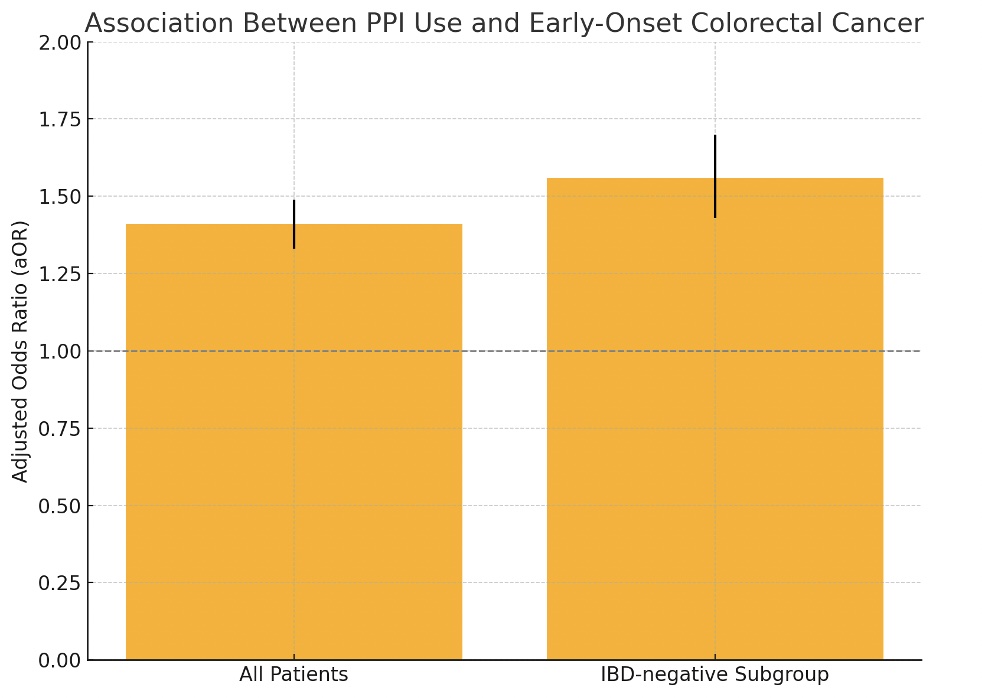Monday Poster Session
Category: Colorectal Cancer Prevention
P2627 - Proton Pump Inhibitor Use Is Associated with Increased Risk of Early-Onset Colorectal Cancer: A Nationwide Cohort Study in Patients Under 50
Monday, October 27, 2025
10:30 AM - 4:00 PM PDT
Location: Exhibit Hall

Ashish Sharma, MD (he/him/his)
University of Connecticut-Hartford
Rocky Hill, CT
Presenting Author(s)
Award: ACG Presidential Poster Award
Ashish Sharma, MD1, Harendra Kumar, MBBS2, Angad Tiwari, MBBS3, Rachael Hagen, DO4, Mohit Kale, MD5, Amanda Frondella, MD4
1University of Connecticut-Hartford, Hartford, CT; 2Dow University of Health Sciences, Karachi, Sindh, Pakistan; 3Maharani Laxmi Bai Medical College, Ghaziabad, Uttar Pradesh, India; 4University of Connecticut Health, Farmington, CT; 5Landmark Medical Center, Woonsocket, RI
Introduction: The prevalence of early-onset colorectal cancer (EOCRC) is rising worldwide, raising concerns about modifiable risk factors. Proton pump inhibitors (PPIs) are often used to treat acid-related diseases; however, long-term use may modify gut microbiota and lower stomach acidity, raising the risk of cancer formation. The effect of PPI exposure on the risk of EOCRC in young people remains unclear.
Methods: We examined the National Inpatient Sample (NIS) from 2016 to 2020, looking for people aged 18 to 49 who had colorectal cancer as their main diagnosis (ICD-10-CM: C18.x–C20.x). PPI use was determined by contemporaneous evidence of long-term treatment (Z79.891) or a negative medication impact (T45.4X5A/D). Multivariable logistic regression was used to evaluate the adjusted risks of EOCRC associated with PPI usage after controlling for age, gender, race, obesity, diabetes, inflammatory bowel disease (IBD), smoking, and hospital-level variables. Subgroup analysis was done in people lacking typical CRC risk factors.
Results: Among 7,140 hospitalizations with EOCRC in patients aged < 50 years, 1,056 (14.8%) reported long-term PPI usage. After multivariable adjustment, PPI users had a significantly higher risk of EOCRC compared to non-users (adjusted OR: 1.41; 95% CI: 1.33-1.49; p< 0.001). This association remained significant in subgroup analysis, particularly among those without IBD (aOR: 1.56; 95% CI: 1.43-1.70). Prolonged inpatient PPI exposure was shown to increase the risk of CRC (p-trend < 0.01).
Discussion: This large, nationally representative study found a robust and independent link between PPI intake and an elevated risk of early-onset colorectal cancer in under 50. These results highlight the need to use PPIs with caution, especially in younger populations, and call for deeper research into the microbiota and inflammatory pathways that link chronic acid suppression to colorectal carcinogenesis.

Figure: Figure 1: Association Between PPI Use and Early-Onset Colorectal Cancer
Disclosures:
Ashish Sharma indicated no relevant financial relationships.
Harendra Kumar indicated no relevant financial relationships.
Angad Tiwari indicated no relevant financial relationships.
Rachael Hagen indicated no relevant financial relationships.
Mohit Kale indicated no relevant financial relationships.
Amanda Frondella indicated no relevant financial relationships.
Ashish Sharma, MD1, Harendra Kumar, MBBS2, Angad Tiwari, MBBS3, Rachael Hagen, DO4, Mohit Kale, MD5, Amanda Frondella, MD4. P2627 - Proton Pump Inhibitor Use Is Associated with Increased Risk of Early-Onset Colorectal Cancer: A Nationwide Cohort Study in Patients Under 50, ACG 2025 Annual Scientific Meeting Abstracts. Phoenix, AZ: American College of Gastroenterology.
Ashish Sharma, MD1, Harendra Kumar, MBBS2, Angad Tiwari, MBBS3, Rachael Hagen, DO4, Mohit Kale, MD5, Amanda Frondella, MD4
1University of Connecticut-Hartford, Hartford, CT; 2Dow University of Health Sciences, Karachi, Sindh, Pakistan; 3Maharani Laxmi Bai Medical College, Ghaziabad, Uttar Pradesh, India; 4University of Connecticut Health, Farmington, CT; 5Landmark Medical Center, Woonsocket, RI
Introduction: The prevalence of early-onset colorectal cancer (EOCRC) is rising worldwide, raising concerns about modifiable risk factors. Proton pump inhibitors (PPIs) are often used to treat acid-related diseases; however, long-term use may modify gut microbiota and lower stomach acidity, raising the risk of cancer formation. The effect of PPI exposure on the risk of EOCRC in young people remains unclear.
Methods: We examined the National Inpatient Sample (NIS) from 2016 to 2020, looking for people aged 18 to 49 who had colorectal cancer as their main diagnosis (ICD-10-CM: C18.x–C20.x). PPI use was determined by contemporaneous evidence of long-term treatment (Z79.891) or a negative medication impact (T45.4X5A/D). Multivariable logistic regression was used to evaluate the adjusted risks of EOCRC associated with PPI usage after controlling for age, gender, race, obesity, diabetes, inflammatory bowel disease (IBD), smoking, and hospital-level variables. Subgroup analysis was done in people lacking typical CRC risk factors.
Results: Among 7,140 hospitalizations with EOCRC in patients aged < 50 years, 1,056 (14.8%) reported long-term PPI usage. After multivariable adjustment, PPI users had a significantly higher risk of EOCRC compared to non-users (adjusted OR: 1.41; 95% CI: 1.33-1.49; p< 0.001). This association remained significant in subgroup analysis, particularly among those without IBD (aOR: 1.56; 95% CI: 1.43-1.70). Prolonged inpatient PPI exposure was shown to increase the risk of CRC (p-trend < 0.01).
Discussion: This large, nationally representative study found a robust and independent link between PPI intake and an elevated risk of early-onset colorectal cancer in under 50. These results highlight the need to use PPIs with caution, especially in younger populations, and call for deeper research into the microbiota and inflammatory pathways that link chronic acid suppression to colorectal carcinogenesis.

Figure: Figure 1: Association Between PPI Use and Early-Onset Colorectal Cancer
Disclosures:
Ashish Sharma indicated no relevant financial relationships.
Harendra Kumar indicated no relevant financial relationships.
Angad Tiwari indicated no relevant financial relationships.
Rachael Hagen indicated no relevant financial relationships.
Mohit Kale indicated no relevant financial relationships.
Amanda Frondella indicated no relevant financial relationships.
Ashish Sharma, MD1, Harendra Kumar, MBBS2, Angad Tiwari, MBBS3, Rachael Hagen, DO4, Mohit Kale, MD5, Amanda Frondella, MD4. P2627 - Proton Pump Inhibitor Use Is Associated with Increased Risk of Early-Onset Colorectal Cancer: A Nationwide Cohort Study in Patients Under 50, ACG 2025 Annual Scientific Meeting Abstracts. Phoenix, AZ: American College of Gastroenterology.

